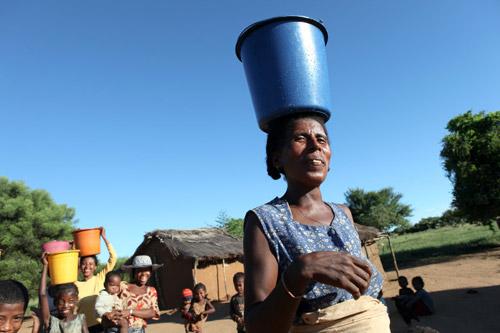

Water maintains an important symbolic role in Judeo-Christian Scripture, theology and sacrament, largely because our faith arose in a land where water was particularly scarce. For much of the world, that situation is their daily reality, with access and rights to life-giving water severely limited.
Nothing is as essential to survival as water. Such is the importance of water in our physical and spiritual lives that the Church places among the corporal works of mercy: “To give drink to the thirsty.”
We in the United States are blessed. We walk to a water fountain and drink. We put ice cubes in a glass, turn on the faucet and drink. We wash dishes and clothes in clean water and nourish crops and gardens with water. After a hard day at work, we can soothe aching muscles in a bathtub of warm, relaxing water. But what if we couldn’t?
With water so crucial not only to our daily nutrition, but to our health and sanitation, it is a challenge to our Christian consciences to consider that nearly one billion people lack access to it. Their stories are hard for us to comprehend. What would it feel like if we ourselves walked in the shoes of our sisters and brothers? Take a moment. Reflect on the daily walks taken by our sisters in Madagascar:
“In the Malagasy community in Beteny, Madagascar, women walk miles a day to collect water for their families’ daily use. They irrigate their small garden plots by digging water out of the sand at the dried out Imanda River and carry it in gourds to water their plants.”
It is difficult to imagine such a way of life. How then can we be in solidarity with people for whom this is the daily routine? What can we do to help?
Catholic Relief Services serves the most vulnerable overseas by helping them develop, protect, manage and improve sources of clean water for drinking, washing, caring for their livestock and irrigating their fields. Over the past five years, CRS has assisted more than two million people worldwide in gaining access to clean water. They have provided more than a million people in rural areas access to improved sanitation in more than two dozen countries, focusing on services for the poorest and most remote communities.
Through our support of CRS, we can grow in solidarity with our sisters and brothers around the world. By educating ourselves about CRS’ water projects, we learn how the journey ends:
“The Malagasy community in Madagascar, benefited from two water points and a treadle pump installed by CRS. The women who used to walk miles a day to collect water for their families’ daily use no longer have to. The treadle pump has made their job significantly easier. What once took six hours a day can now be accomplished in two and a half hours. They’ve also noticed that their crops — and harvests — are much heartier too.”
World Water Day is celebrated annually on March 22. In 2013, students at Loyola University Maryland challenged their school community to deepen their awareness and take action on the lack of access to safe, clean water around the globe. Students covered the campus in blue, kept a heavy multi-gallon water bucket in motion for hours to simulate long treks women and children make to collect water for drinking and washing and coordinated a mural of water drops adorned with facts that students and faculty learned during the day.
In what way might you, your family and your parish community do 2016? What can you do to stand in solidarity with those around the world who do not have access to safe water? How else, in this Year of Mercy, can we give drink to the thirsty?
Please read our Comments Policy before posting.
Article comments powered by Disqus One Church drive for small Decatur church at halfway
One Church drive for small Decatur church at halfway
 Resettlement program seeking housing for new refugees
Resettlement program seeking housing for new refugees
 Interpreters, medical volunteers needed for clinic
Interpreters, medical volunteers needed for clinic
 Caseworkers continue state's long-term tornado recovery
Caseworkers continue state's long-term tornado recovery
 Catholic Relief Services: Rice Bowl Lenten sacrifice
Catholic Relief Services: Rice Bowl Lenten sacrifice
 Winning directory photo honors Our Lady of Guadalupe
Winning directory photo honors Our Lady of Guadalupe
 St. Paul says: How does the Bible define love?
St. Paul says: How does the Bible define love?
 6 steps to getting married in Diocese of Little Rock
6 steps to getting married in Diocese of Little Rock
 Most frequently asked questions on Catholic marriage
Most frequently asked questions on Catholic marriage
 St. Joseph a model of solidarity with immigrants
St. Joseph a model of solidarity with immigrants
 Two gifts after Jesus’ death: Virgin Mary and Eucharist
Two gifts after Jesus’ death: Virgin Mary and Eucharist
 Why we have an altar, and not just a communion table
Why we have an altar, and not just a communion table
 Pope: Wars should be resolved through nonviolence
Pope: Wars should be resolved through nonviolence
 Living relationship with Jesus Christ in the Eucharist
Living relationship with Jesus Christ in the Eucharist